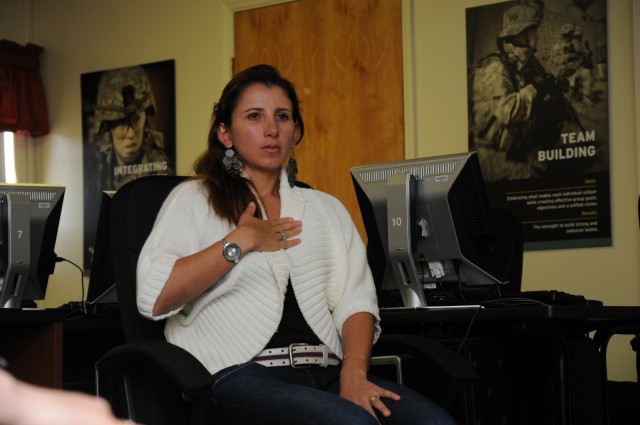FORT BRAGG, N.C. - Military spouses play many roles and when those roles meet, it can be difficult to balance expectations and the stress that comes with everyday life. Add in a deployment and the spouse has to continue with his or her normal routine, but also add the tasks ordinarily taken on by the deployed Soldier.
Spouses of deployed Soldiers often have to play the role of mother and father. They balance all the tasks that come with daily life from dinner to errands to routine maintenance on cars and the home as well as any emergencies that may surface. Add in school or work, as well as reassuring parents on both sides that everything is okay can get a little trying.
To help military spouses cope with some of the stress brought on by everyday life, the Army Center for Enhanced Performance is offering Mind-Body classes to teach spouses techniques to balance stress and recovery. These classes are part of Fort Bragg's effort to support its Soldiers, Families and Army civilians with programs that meet their needs, further enabling them to maintain resiliency.
"ACEP offers these mind-body classes to help Army Families to effectively manage their stress and recovery energy, both of which are essential for optimal daily functioning," said Seth Kaplan, ACEP performance enhancement specialist.
Juliana Tobon was one of the spouses attending Friday's class. Her husband, Sgt. John Tobon, recently returned from a deployment to Afghanistan as part of Company B, 122nd Aviation Support Battalion, 82nd Combat Aviation Brigade, 82nd Airborne Division. She said that she values classes like the ones offered by ACEP.
"I feel like this class helps you grow as a person," said Tobon. "My husband just got back and you like to think that it's okay and getting back to normal is easy, but it's not. This is my first deployment and it's nice to have the chance to learn what to do to make it easier."
The class helps spouses understand the difference between circumstances that they can control and those they can't control. While some situations cannot be changed, the students learn that they can control their own response to what they perceive.
"The tools and techniques that we teach, such as rhythmic breathing, visual and auditory imagery, and progressive muscle relaxation, are easy to learn and apply. They help to gain a positive mind/body interaction," said Kaplan.
Christine Macko's husband, Sgt. 1st Class Robert Macko, is currently deployed to Afghanistan with 3rd Bn., 82nd CAB. She said that she was looking forward to learning ways to alleviate stress.
"It's been tough. I've been juggling my schedule, everything going at home, the kids and then the dog just died. I've learned not to say 'what else can possibly go wrong,' though because then the school calls," said Macko. "It's a lot to have to go through. Hopefully this class will lead to some peace in the house."
Kaplan highlighted some of the issues that Army spouses face, which included lack of sleep, anxiety, self doubt, depression, feeling overwhelmed, loneliness and isolation. Each one of the women attending the session admitted to feeling one or all of the symptoms in their daily lives. He said that by consciously controlling what you think, say, do and how you feel is the one way to lessen the amount of stress these issues and others generate.
"The underpinning of it all is enhancing awareness of one's thoughts and feelings and how they influence actions and behaviors," said Kaplan. "By doing this, you can leverage your mental skills to perform at your best."
Future Mind-Body classes for Army Families are scheduled for May 7 and 21. ACEP also has Peak Performance classes for Soldiers on May 6 and 20. All classes start at 10 a.m.
For more information or to register, call ACEP at 396-0727 or e-mail seth.kaplan@us.army.mil.


Social Sharing